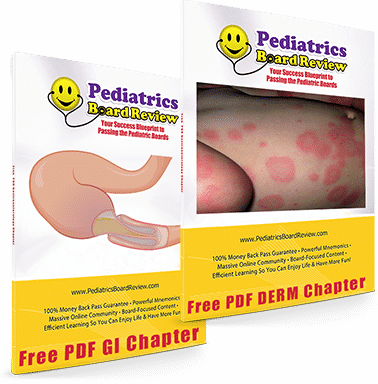2025 MOCA-PEDS Learning Objectives and Featured Readings
PEDIATRIC BOARD REVIEW COURSE 2023 (13TH EDITION)
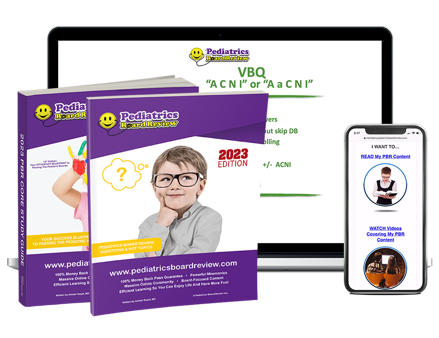
In this article, we’ll learn about pediatric board review courses being offered in 2023 and learn why live courses are broken. We'll also be sharing resources and recommendations for those looking into live board review courses, along with a review of the 2023 pediatric board review course created by Pediatrics Board Review (PBR).
PBR was created by me, Ashish Goyal. As a pediatrician, I excelled when I increased my score by 160 points on the American Board of Pediatrics (ABP) Initial Certification exam. I was then asked by the ABP to write questions for them.
Now, as an author, my mission is to provide the best pediatric board review materials to residents and pediatricians. And I’ve been doing this successfully with PBR since 2011.
As physicians, we're trained to learn “everything” in our field, and we apply the same methodology to how we prepare for an exam. We start from the first sentence and take a top-to-bottom approach.
But these strategies do NOT work when you are studying for the pediatric boards.
That’s why at Pediatrics Board Review, we focus on creating a full, one-stop shop for you to focus your learning on three things. They include:
- The specific topics that will be tested on the exam.
- The strategy behind test taking, and how to deconstruct difficult questions with ease.
- The tools, schedules, and systems needed to promote efficiency and accountability.
This article will be covering a LOT about what pediatricians just like you need to pass the pediatric boards (and how we have been providing that successfully for the past decade).
The system that we’ve created has been proven to be much more effective (and cheaper) than attending a 4-6 day long course where you're expected to learn everything about pediatrics. And if the thousands of happy pediatricians are any indication, using the PBR Certification Methodology is the way to go (but more on that later).If you are set on finding a traditional, live pediatric board review course, we do offer some advice and resources to help. Keep reading below to find a list of companies we've compiled who are offering live pediatric board review courses and the cost of attending. But, if you have 5 minutes, take the time to read this article because it will likely save you time, money, and energy.
Through this article, and through videos like the one below, you will begin to quickly understand why a “traditional” pediatric board review course can lead to failure. PBR is not a traditional board review company, and we focus on helping physicians in ways that have never been done before. In the video below, I share with you the arrival of the a new edition the PBR Core Study Guide, the Question & Answer books, our Test-Taking Strategies Course, and information around the differences between PBR and other board review courses that allow us to excel at what we do.
So hit “play” button below and watch this book “unveiling” video to get an excellent understanding of what makes PBR different than any other medical board review program.
Click here to get the full Pediatric Dermatology and Pediatric Gastroenterology chapters from THIS YEAR's EDITION of the PBR so that you can TRY BEFORE YOU BUY!
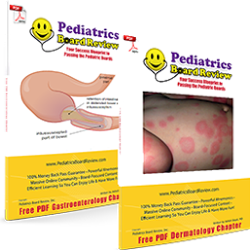
THE MAKINGS OF A GREAT PEDIATRIC REVIEW COURSE
What Makes a Great Pediatric Board Review Course?
Having been around pediatric board materials (and helping pediatricians pass!) for more than 10 years, I have found the key to any successful pediatric review course which boils down to 5 key elements:
- CONTENT CONGRUENCY: Having materials that work cohesively together has been proven to better reinforce knowledge in our brains. This is compared to having several disjointed study materials with competing methodologies. Congruency promotes a smarter, not harder, studying experience.
- BOARD RELEVANT MATERIAL (NOT ALL MATERIAL!): No course should try to shove as many topics as possible into your brain; that will only lead to overload! Pick a course that provides a laser focus on the topics that are known to be tested, and curates your study experience around those topics.
- A FOCUS ON THE TEST-TAKING STRATEGY (JUST AS MUCH AS THE TOPICS): Everyone has a colleague, a friend, or a family member who is very intelligent, but tests poorly. When it comes to standardized tests, knowing how to test is just as important as knowing about the subject being tested! So, your chosen course should place a high emphasis on teaching you how to TEST well.
- INTERACTION: A course that promotes interaction with both your peers and the instructor can lead to a better study experience. Trying to study in isolation for hours on end, with an instructor just talking at you, will only limit the amount of information you retain. It will also provide zero opportunity for you to gain clarification on the difficult topics you struggled with.
- MULTIPLE RETENTION TECHNIQUES: Everyone learns at a different pace, so finding a course that utilizes several retention techniques to help you solidify what you are studying is key.
It was after working with several pediatricians on their board exams that I started to realize that there was a major gap in the medical education field that covered all 5 elements, and pediatricians were suffering the most because of it. This is why I created the PBR Certification Methodology over 9 years ago, and why it is at the core of everything that PBR offers.
A PEDIATRIC BOARD REVIEW COURSE WITH A 100% MONEY BACK FIRST-TIME PASS GUARANTEE
What is the PBR Course?
The PBR's 2023 pediatric board review course offers you a complete SYSTEM. We not only teach you about the pediatric topics you need to know for the boards, but we also teach you test-taking strategies and Deep Study techniques to ensure you have the BEST chance at passing your pediatric board exam. We also provide a peer-group for educational support.
For the 2023 American Board of Pediatrics initial certification exam, maintenance of certification (MOC) exam, and MOCA-Peds assessment, here are a few of the reasons that pediatricians prefer PBR:
- You learn more than enough pediatric content to get a score that is ABOVE the national average.
- You understand the reasons to AVOID pediatric “board review questions” as a source of learning.
- You learn about test-taking strategies that allow you to answer board questions quickly and accurately (even when you're not fully knowledgeable about a topic).
- You learn to create a streamlined study schedule to prepare for the boards that will liberate you from the confusion and overwhelm that you're currently experiencing.
- You learn how prepare for each of these exams efficiently.
The PBR Certification Methodology Includes…
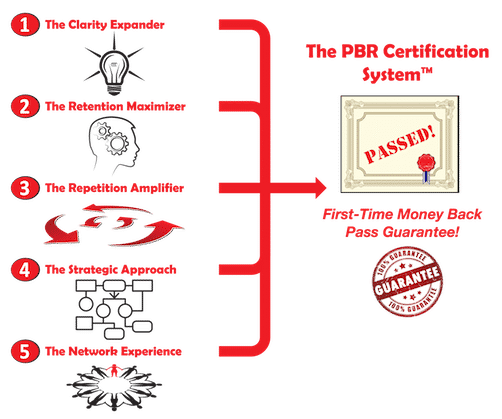
- The Clarity Expander: One of the toughest obstacles to overcome while studying for the pediatric boards is clarity. This means having a firm understanding of what you do (and do not) need to know in order to pass. For example, did you know that the AAP PREP questions are NOT the best study questions? Or, that you should NOT try to study every single topic laid out in the American Board of Pediatrics content outline? Or, that if you failed last year, you should NOT tailor your studies to address low scores from your score report? PBR’s system is the only proven system to help you gain clarity on these nuances so that you study smarter, not harder!
- The Retention Maximizer: Maximize your chances of content retention through common sense explanations, innovative “DOUBLE TAKE” topics which are repeated throughout the Core Study Guide, PBR “PEARLS” that are almost guaranteed to show up on the exam, story-based mnemonics, and concise content.
- The Repetition Amplifier: Utilizing a multimodal approach to studying through hardcopy books, online videos, downloadable MP3s, mobile access, an online picture atlas, and other creative techniques allow you to review the same core materials in multiple ways. By promoting studying via multiple modes, our system encourages deeper learning to help you while studying for the pediatric boards!The Strategic Approach: Learn Test-Taking Strategies that allow you to systematically approach, process, and answer board-style questions on standardized exams. There are rules that you can learn to help you “beat the boards” and pass your exam. There is also a structured approach to processing every single board-style question in order to make the experience error-free and robotic.
- The Network Experience: Do NOT study in isolation. Utilize the support of hundreds of pediatricians in the PBR Discord Community to help you quickly answer your board review questions. You can also work with Team PBR to create a study schedule specifically designed for you, and you can attend live webinars with content experts to help blow past complicated questions that are slowing you down. Just press the “ASK THE EXPERT” button. Then, you can focus on your studying while we do the research. Again, you should not have to do this alone, and the PBR community is here to support you.
WHY WE DON’T OFFER A TYpical, LIVE PEDIATRIC BOARD REVIEW COURSE
Why Typical, Live Pediatric Board Review Courses Won’t Work in 2023
Beyond the fact that they are incredibly expensive, the typical live courses are not set up to give you a strategic study method to pass the boards. In fact, the entire system is broken.Here is a comparison chart for you to see the difference between a typical board course, and PBR:
Your TYPICAL Board Review Experience | The PBR Board Experience |
|
|
Does the “typical” experience sound familiar? It definitely does to me because that's exactly what I did when I failed the pediatric board exam the first time I took it.
I was SHOCKED. But, I eventually uncovered multiple secrets to help me pass the initial certification exam and increase my score by 160 points.
Then, through my many trials and errors, I created a SYSTEM that has gone on to help so many pediatricians pass the exam.
This system has not only helped first-time test takers pass the boards on their first attempt; it has helped high-risk pediatricians FINALLY pass after multiple failed attempts. Every year, we get tons of testimonials from pediatricians that finally pass after as many as seven failed attempts!


PBR is about maximizing your learning experience through a proven system that helps you pass the boards.
For anyone who has failed the pediatric boards before, or anyone who has struggled to get above a 222 on the USMLE Step 1, our Test-Taking Strategies & Coaching course is a breath of fresh air. Also, while live courses that cover “all of pediatrics” are of little benefit, a LIVE, 2-Day Test-Taking Strategies Course is the most leverageable option to accelerate someone's understanding of the test-taking techniques and topics needed to become a test-taking NINJA!
THE MOST EFFICIENT PEDIATRIC BOARD REVIEW COURSE 2023 HAS TO OFFER
What are the Pediatrics Board Review (PBR) Resources?
At the center of the PBR system, you will find the Pediatrics Board Review Core Study Guide and the Pediatrics Board Review Q&A book. We focus on the idea of having congruency across all of our resources. So, all of our pediatric study materials are born from these two resources. This is done so we can help you get the repetition and reinforcement needed as you go from one PBR resource to another.

PBR's CORE STUDY GUIDEThe PBR Core Study Guide is your content Bible. No more buying 3-4 different study materials to hodgepodge a study schedule together. We have done the curation of content for you! If it's not in your PBR Core Study Guide, then YOU DON’T NEED TO STUDY IT.
- Offered in hardcopy and online formats
- Contains a Success Blueprint and Roadmap to Success which tells you exactly how to use the PBR resources
- Has a strong focus on testable and tested topics
- Includes hundreds of time-saving story and image based mnemonics,along with other memory aids
- Contains online systems which allow for one-click access to HUNDREDS of high-yield images across the web
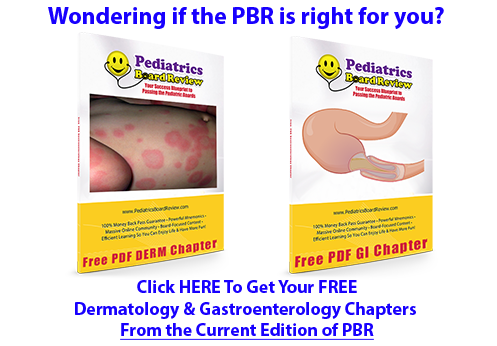
PBR's QUESTION AND ANSWER (Q&A) BOOK
This is NOT like other question banks. This is valuable, high-yield content that's just as valuable as the PBR study guide and should be used as part of your core content review. Use OTHER pediatric prep questions for PRACTICE. KNOW the difference between what to study versus what to use for PRACTICE.
- Available in hardcopy and online formats
- Extremely high-yield questions and answers
- Contains detailed explanations and excerpts from PBR's Core Study Guide
PBR's ONLINE PEDIATRIC BOARD REVIEW VIDEO COURSE (OVC)Get the value and insight of a live conference from the comforts of your room. This is your “online version” of an in-person pediatric board review course, or a DVD course, except you can take it ANYWHERE because it's compatible with your internet-enabled phone or tablet.
- Videos cover the entire PBR Core Study Guide and the PBR Q&A Book
- Live summertime question and answer webinars featuring content experts to answer all of your questions
- Online pre-webinar question portal which allows you to send in your questions as they come to mind
- Recorded webinars are available for replay
- Learn from board-certified PBR alumni
PBR's PEDIATRIC BOARD REVIEW AUDIO COURSE
Maximize your efficiency by taking the audio course with you to the gym, the grocery store, your car, or the mall.
- The MP3 course is available as a streaming OR a downloadable resource.
- Load the downloadable version onto your favorite MP3 player, or listen to it on your computer.
- Listen to the streaming version via your desktops or mobile device.
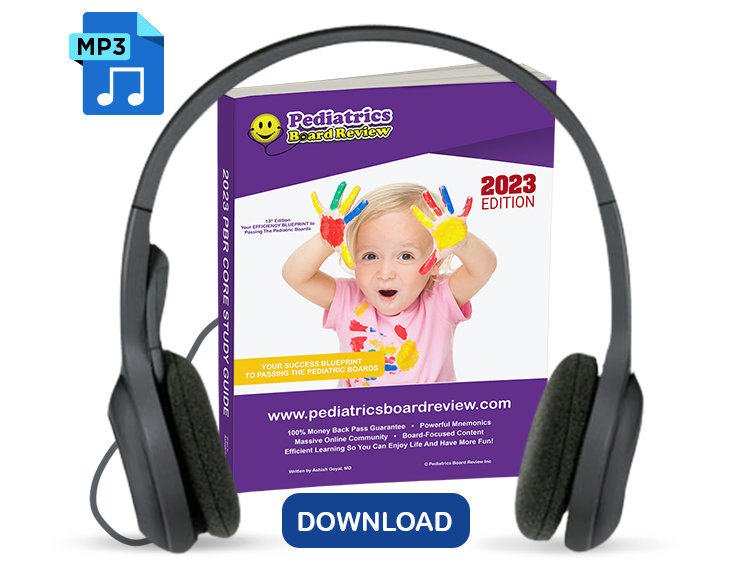
PBR's DIGITAL PICTURE ATLAS
Review 400 of the most high-yield and board relevant images QUICKLY through the power of the web and without having to flip back and forth in your Zitelli. This is also known as the Virtual Atlas of Pediatric Pictures (VAPP).
- Accessible on your desktop, mobile device or tablet
- Available in PDF or Online Format
- Access all of the PBR images in ONE place with reference posts available for review
- Quick access to the corresponding topic within the PBR study guide

PBR CORRECTIONS AND CLARIFICATIONS GUIDEAs with everything in medicine, things change. To make the PBR materials as error-free and up-to-date as possible, we use all of your suggestions and error submissions to create a Corrections and Clarifications guide.
Here are the benefits of the Corrections and Clarifications Guide:
- Receive updates in the world of pediatrics
- Review a detailed list of corrections to our materials
- Obtain an advanced look at NEW content that is going to go into the next edition
- Get answers to questions that you have submitted to us for review or clarification
PBR's DISCORD COMMUNITY!A critical component to the success of so many pediatricians is PEER SUPPORT! Without it, your efficiency and your drive to study can plummet. The PBR Discord Community is a pediatric board review forum that is exclusively for PBR members.
The forum allows you to:
- Ask questions about topics that are confusing you.
- Share mnemonics and insights of your own.
- Get educational and emotional support during one of the most stressful times of your life.
- Increase your EFFICIENCY by leaning on others to answer your questions instead of going to the black hole of Google.
PBR's TEST-TAKING STRATEGIES & COACHING“Test Day” can be a terribly stressful time for the pediatric board exam. The key to avoiding test anxiety is to:
- Have a solid foundation of knowledge.
- Make the process of answering questions almost mechanical.
Your board exam is like a GAME with rules that CAN be learned. There are strategies you can to learn in order to master your question-answering technique. Through PBR's ONLINE Test-Taking Strategies & Coaching courses, you quickly learn how to identify answers EFFICIENTLY, leaving you with time to spare.
The online course is a MUST for everyone taking the Initial Certification exam, even if you are attending our Live Test-Taking Strategies & Deep Study Course.If you've ever struggled with any medical board exam in the past, or if you did not score above a 222 on the USMLE Step 1 exam, we strongly suggest the Live Test-Taking Strategies & Deep Study Course.
- Learn how to answer questions with little knowledge on a given topic.
- Learn shortcuts that allow you to answer certain questions WITHOUT reading any of the vignettes.
- Learn why focusing on the ENGLISH (more than the medical concepts) can help you zero in on the correct answer choice when you're left with those final two options.
- Get the Core Concepts in Test-Taking Strategies Webinar to learn the fundamentals of test-taking strategy.
- Get 5 QUESTION PROCESSING webinars to go deeper into advanced test-taking strategies as you learn to process questions systematically.
- Learn shortcuts, including what it means to have answer choices that are either very similar or complete opposites.
- Learn techniques to address problems with diet, anxiety, insomnia, and test-day fatigue.
- Get help creating your own test-day schedule. Learn what to do during your breaks, what to eat, what NOT to eat, how to remain as energized at the end of the exam as you were at the beginning of the exam, and much more!
We've helped pediatricians succeed after SEVEN failed attempts. Imagine what this program could do for you.
THE LIVE 2023 PEDIATRICS BOARD REVIEW TEST-TAKING STRATEGY COURSEIn addition to the online courses, I also offer live training to teach you test-taking strategies to help you pass the pediatric boards.
Compared to the online courses, the Live Pediatrics Board Review Test-Taking Strategy Course gives you a unique experience to get your questions answered and tailored to you. If you scored as high risk on the PBR Risk Calculator, this course would be the best way to ensure a pass on the boards.
PBR is the first medical board review company to offer a comprehensive course on test-taking strategy and “deep learning.” We have helped pediatricians become MASTER test-takers so that they can increase their chances of passing the boards exponentially.And with our new, Zoom-based live course, the live course can be attended from the comfort of your home without the expense of travel or lodging. Be sure to check our live page to see when both the in-person and Zoom courses are available.
ALL OF THE PHYSICIANS BELOW PASSED AFTER GOING THROUGH THE TEST-TAKING STRATEGIES COURSE
Click here now and learn more about the 2023 Pediatrics Board Review Live Course On Test-Taking Strategies & Deep Study.
A COMPREHENSIVE SYSTEM TO HELP YOU PASS THE BOARDS IN 2023
The “No Brainer” Package: Everything You Need to Pass the Initial Certification Exam
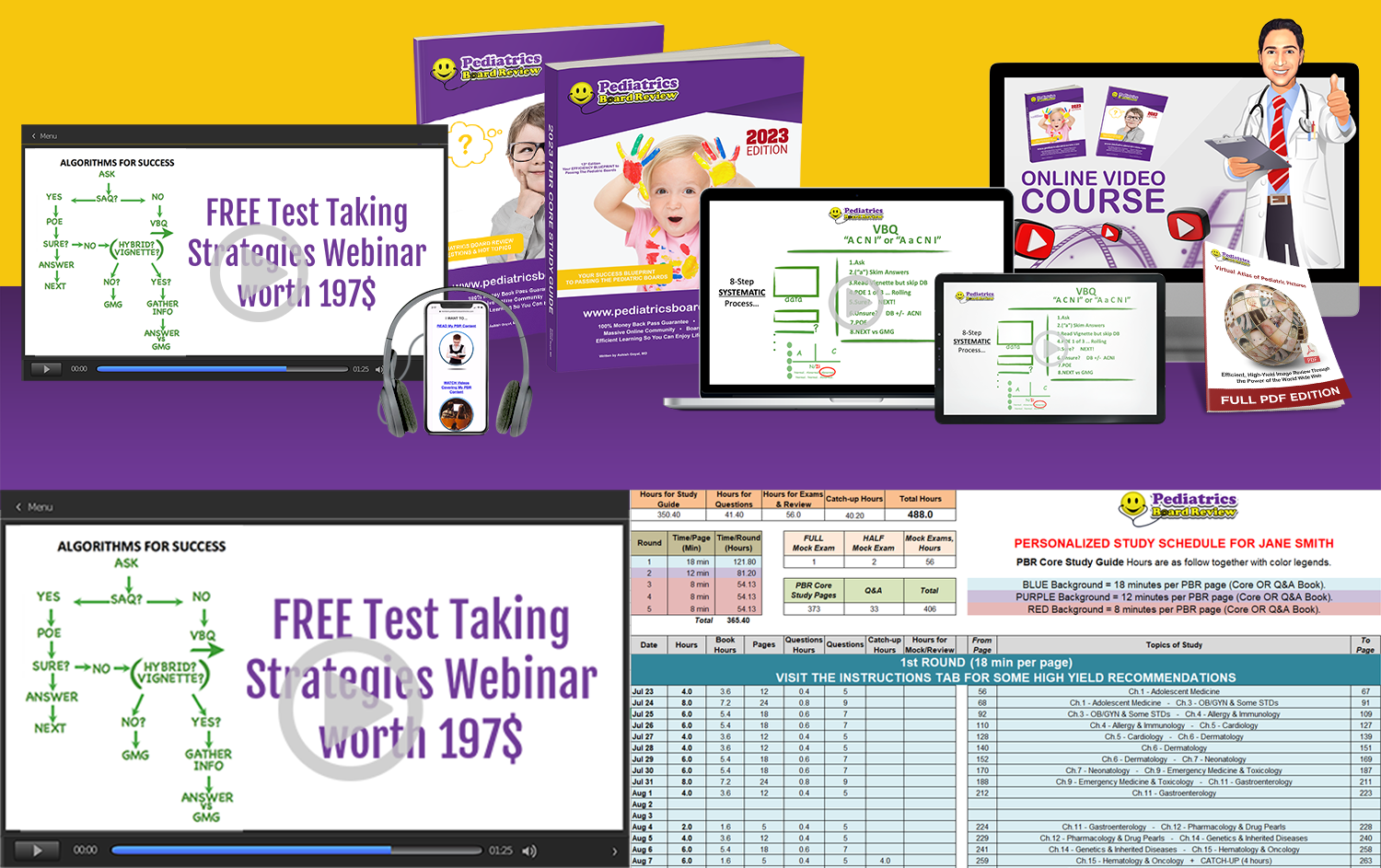
PBR was created to help others avoid failure and frustration. Pediatricians get frustrated about overwhelming and incongruent resources. They also get frustrated by overwhelming costs.
PBR has been part of the solution by pioneering newer, faster, and more effective strategies to educate pediatricians. The Online Video Course, the Virtual Atlas of Pediatric Pictures, the live summertime webinars, and the members-only Discord support area are just a few ways we've changed how doctors think about board review.
I want you to focus on the CONTENT, the COMMITMENT and the TECHNIQUE needed to pass the boards. Not the chaos around multiple resources, or the expense related to a resource that could be helpful.
That's why we recently created the No Brainer package. It includes 100% of our multimodal content-based resources to help you build your fund of knowledge through our All Access Pass. It also includes the option to have Team PBR create up to three 90-Day Personalized Study Schedules specifically for you to help with accountability and commitment. And it also includes our Full Online Test-Taking Strategies Course to help you with your test-taking technique. All for less than the cost of a single board review video course.
The enrollment fee for the NO BRAINER package is almost 50% OFF and it offers all of our knowledge base resources. Plus, it’s less than the cost of a single, traditional video course.
Stop thinking about money and start focusing on what you can do to pass the boards. Get the access you need for less than the cost of any major pediatric board review video products on the market.
“NO BRAINER”

It's what you “should” get for the Initial Certification exam. Learn the pediatric content AND the test-taking strategies to pass. Plus, get up to 3 Personalized Study Schedules created by Team PBR.
12 Months of Access
- Core Study Guide in Hardcopy and Online Formats
- Q&A Book in Hardcopy and Online Formats
- MP3 Audio Course in Downloadable and Streaming Formats
- Pediatric Picture Atlas in Downloadable PDF and Online Formats
- Online Video Course Covering All 31 PBR Chapters
- “ASK THE EXPERT” Question Portals for All 31 chapters
- Live Q&A Webinars with Content Experts for All 31 Chapters
- Test-Taking Strategies Core Concepts Webinar
- Test-Taking Strategies FULL Online Course
- A 90-Day Personalized Schedule created by Team PBR Based On Your Work Schedule, Pace of Reading, Risk Profile & Much More
- 2nd 90-Day Personalized Schedule
- 3rd 90-Day Personalized Schedule
- Free Expedited Shipping
- Discord Community Access!
- 100% Money Back First-Time Pass Guarantee
WHAT PBR MEMBERS HAVE TO SAY
Tears of joy are wonderful. No thank you could ever be sufficient for all the support and guidance from Ashish and PBR over the past couple of years. Ashish who truly cares and believes in each individual person and helps guide them. I honestly used to laugh at the people who said they improved by 30 or more points, didn't think it was possible. It’s more than possible with PBR and can't thank Ashish enough! I failed each of the past 3 years not even getting within 5 points of passing. I never ever thought of quitting or giving up. I went all in with PBR including the core study guide (8X!!), all access pass including the videos and audio, live test taking strategies course and a 2 hour 1-on-1 session with Ashish after having a moment of revelation. LISTEN to this man. Follow his advice word for word. I finally PASSED on the 4th attempt! I improved my score by 42 points!!! It takes an army to go through this. I had to sacrifice being with my family, but we did it together. I hope and pray everyone reading this that's ever failed or struggled with test taking in general to not give up hope. It can be done. Cheers!
Dr. Russell Zwiener Board Certified Pediatrician (2018 Member)
Ashish, I did it. I can't thank you enough for creating an amazing system to keep me on track with my studying… the live weekend test taking course was well worth it. Doing the technique during the test kept me focused and allowed me to eliminate wrong answers. Thank you for all the great advice, sticking to the material, memorize, memorize, memorize then practice practice practice. After 4 failed attempts it was exhilarating to finally read the words, “we are PLEASED to announce you PASSED!” I will definitely recommend your program.
God Bless
Dr. Yessenia Castro-CaballeroBoard Certified PediatricianAll Access Pass MemberLive Test-Taking Strategies & Deep Study Course Attendee4 Prior Failed Attempts
I am an intelligent driven pediatrician who took her Boards for the first time because her job paid for it and told her to “see what it was like.” No studying – just walked in and took it. And failed – shocking at the time – not shocking now.
The second time I took my boards – I studied – I used multiple sources – and I failed. Scoring the same as the first time. Again – what the hell happened?
The third time – I took a Board Review Course in Washington DC. I stuck with Cleveland Review. I practiced questions – but not enough (I know that now). And I took the test again – and failed by 10 points. I was in shock –
The fourth time – I found PBR – I loved it. I practiced questions (thousands – but no AAP or Medstudy – just board vitals and exam master). I took the online PBR test taking strategy course. And I failed – by 4 points. Again shock set in.
I mustered up the courage to take it again. I met with you to dissect where I went wrong. I came to Atlanta. I followed your advice – even though sometimes I didnt like it 😉 You encouraged me to get my eyes checked (double vision issues that I never truly addressed except with thicker prisms) and recommended Frannie. Then my world changed – not only in respect to passing my boards – but my actual life – My vision was a disability that I have been living with for years and I didnt even realize it. The doctor I met for vision therapy (where I felt skeptical at first) showed my what my world was missing. My visual fields were so restricted I was tunneling my vision. I was reading with only intermittent use of my left eye (my brain was shutting it off bc of the doubling). My comprehension on questions was limited and I had to read and reread questions to simply understand them. I started visual therapy and it has been life changing. And I have you to thank for your perseverance and support. I have God to thank for aligning our paths. And I have Frannie to thank for the nudges and phone calls and emails of encouragement.
Thank you Ashish – for changing my world – you are meant to continue PBR for those smart physicians who are being belittled by an organization that is meant to support us. Thank you for the Atlanta class – I met the most amazing study partner and we both passed – Just thank you! I would love to have the opportunity to help you with PBR if you are looking for physicians… We can only be stronger together.
Kate Johnson-Clark Board Certified Pediatrician (2018)All Access Pass MemberPersonalized Schedule UserLive Test-Taking Strategies & Deep Study Course Attendee4 Prior failed attempts
Ashish I passed!!
I am thankful for your team. For the personalised schedules… and how will I forget the Atlanta test-taking strategy course?.
Aside from the fact that a lot of your strategies were eye opening and super helpful, it hit me that I was not alone. Through the years of depression, of doling out money for the exams and the near-passes (few pts below 180), I found some strength to believe that I wasn't dumb and that I could pass!
I could go on and on. You have NO idea how the yrs have been for me. I only know it was my faith in God that kept me going, determined to get to this. My husband has been such a solid, solid rock beside me through this. He's right there , sometimes just listening on those nights when I'll cry and wonder; where did I go wrong?, what am I doing wrong every year? Am I soooo poor at test taking?…..
Let me just stop by saying THANK YOU Ashish for what you do. Please keep doing it. People may say; well he makes money for it. But no dear, that sacrifice of your time, the passion you bring with each teaching session and webinar, the constant unwavering faith in those you mentor……. NO you don't put a price tag on that!
For that I am grateful. You make an impact in people's lives.
Please do say thanks to your entire team as well.
I thank God for bringing PBR my way.
Dr. O. E. Board Certified Pediatrician Live Test-Taking Strategies & Deep Study Course Member 6 Prior Failed Attempts
Everything I’ve mentioned above is just a small overview of why PBR is again the most popular pediatric board review course in 2023. I’m so excited for all the new members currently studying with us, and can’t wait to see how many new pediatricians we have come October. If you're not a member yet, what are you waiting for? Click the image above and signup now!
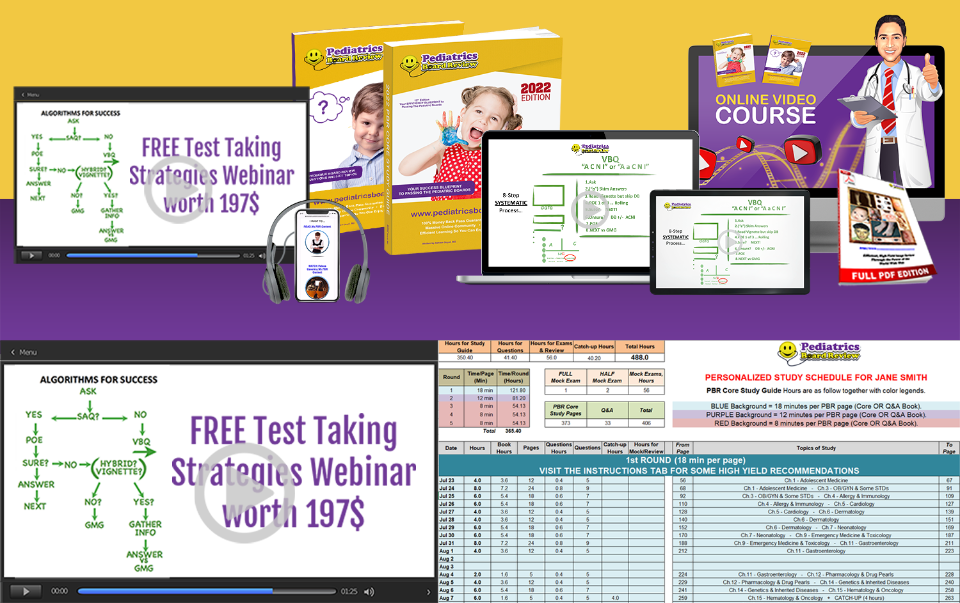
Comparison Chart of 2023 Pediatric Live Courses + Costs
Alright, now if you went through this entire article and still would prefer to head to a live course, as promised, here is a list of live pediatric review courses available for 2023, in addition to their cost and the estimated expense of travel, hotel, and ground transportation.
At the end of the day, this article is meant to help you have all the information necessary to find a partner in studying for your pediatric exam, so I do hope you find what you are looking for (even if it’s not with the PBR family!).
But, please note that the course dates for all of the companies below is extremely late in the year. If you’re preparing for the initial certification exam, you need to start studying yesterday!
| LIVE COURSES | PRICE | FLIGHT, HOTEL, GROUND TRANSPORTATION |
| MedStudyAugust 5-10, 2023 (Tentative)Crystal City (Washington DC) or Online | $1499* | ADDITIONAL EXPENSE can be expected for two-way plane tickets or roundtrip gas, 5-night hotel stay, plus LOST WAGES. |
| UCLA ReviewAugust 29 – September 1Online | $500 – $950* | ADDITIONAL EXPENSE expected in the form of LOST WAGES. |
| Cleveland ClinicAugust 27 – September 1, 2023The Ritz- Carlton, Cleveland, OH | $1,075 – $1295* (in 2022) | ADDITIONAL EXPENSE for two-way plane tickets or roundtrip gas, 5-night hotel stay, plus LOST WAGES. |
| Michigan Live ReviewAnn Arbor, MI | $850 (in 2018) | Estimated at approximately $1600 of ADDITIONAL EXPENSE plus lost wages. |
* Prices above are as of 2022-11-25.
“NO BRAINER”

It's what you “should” get for the Initial Certification exam. Learn the pediatric content AND the test-taking strategies to pass. Plus, get up to 3 Personalized Study Schedules created by Team PBR.
12 Months of Access
- Core Study Guide in Hardcopy and Online Formats
- Q&A Book in Hardcopy and Online Formats
- MP3 Audio Course in Downloadable and Streaming Formats
- Pediatric Picture Atlas in Downloadable PDF and Online Formats
- Online Video Course Covering All 31 PBR Chapters
- “ASK THE EXPERT” Question Portals for All 31 chapters
- Live Q&A Webinars with Content Experts for All 31 Chapters
- Test-Taking Strategies Core Concepts Webinar
- Test-Taking Strategies FULL Online Course
- A 90-Day Personalized Schedule created by Team PBR Based On Your Work Schedule, Pace of Reading, Risk Profile & Much More
- 2nd 90-Day Personalized Schedule
- 3rd 90-Day Personalized Schedule
- Free Expedited Shipping
- Discord Community Access!
- 100% Money Back First-Time Pass Guarantee








